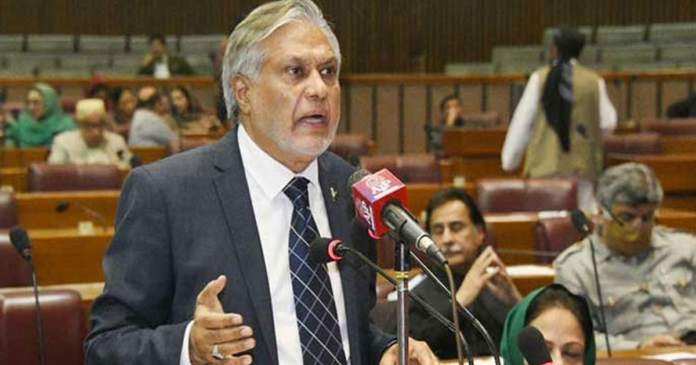Ishaq Dar, the federal minister of finance and revenue, stressed on Saturday that the FY2023–24 budget differs from previous conventional budgets because it emphasizes progress connected to economic growth.
Budget 2023-24 is growth-oriented: The minister spoke at a press conference following the government budget presentation for Fiscal Year 2023–2024, which included a total expenditure of Rs14.5 trillion.
The finance minister told a press conference that the coalition government would remove trader objections before sending the federal budget to parliament. The minister said he would create two committees to handle technical and business-related issues.
Ishaq Dar said, “There is a usual practice inside the FBR of convening two committees, one for business-related concerns and the other for technical matters.
The finance minister stated that the FBR chairman would constitute committees by Monday. The finance minister added that the major goal of creating these committees is to address any overlooked details and allow people to consider their sincere objections.
“No new tax was levied.”
Dar supported the public and private partnership’s allocation of Rs. 950 billion and Rs. 200 billion, calling it a “new high.” He emphasized how the FY2023024 budget differs from previous conventional budgets in that it emphasizes development connected to economic growth.
Ishaq Dar added, “This year, we are not imposing any new taxes, and the government has made every effort to offer relief.”
He stated that the administration wanted to compensate for the lost economic output. “There would be more employment prospects, less inflation, and more jobs created. In turn, the policy interest rate would also drop,” he continued.
“No new tax was levied.”
He added that the government expenditure for the upcoming fiscal year [2023–24] was projected to be Rs14,040 billion and that inflation would be approximately 21%.
Reforms are needed in the power sector.
According to the finance czar, the budget’s allocation for the power sector alone totaled more than Rs1900 billion. He emphasized the importance of addressing and enhancing this industry.
Dar underlined the focus on the renewable energy industry and clarified that no additional subsidies were being provided in this area.
The minister addressed the dissemination of a different story on removing edible oil and clarified that there has been no such removal.
Pakistan will not make a default.
The finance minister reaffirmed that Pakistan will not default firmly, adding that this has always been the case and will continue to be the case. Furthermore, he agreed that the European nations would extend Pakistan’s GSP-Plus status.
He made it plain in response to a question that Pakistan has no plans to reschedule Paris Club or multilateral debt. He continued, “We will make all the installments on schedule.
Dar clarified that the packaged milk is not subject to sales tax. He claimed that the import sales tax on edible oil had not been eliminated. He claimed that global tendencies are to blame for the recent drop in the price of edible oil.
Finances 2023–24
Senator Ishaq Dar, the federal minister of finance and revenue, unveiled the fiscal Fiscal Year 2023–2024 budget on Friday, revealing total spending of Rs14.5 trillion.
The finance minister began by contrasting the economic results of the Pakistan Tehreek-e-Insaf (PTI) governments and the Pakistan Muslim League-Nawaz (PML-N).
On Friday, Senator Ishaq Dar, the federal minister of finance and revenue, unveiled the federal budget for Fiscal Year 2023-2024. The budget has total spending of Rs14.5 trillion.
The finance minister began by contrasting the economic results of the Pakistan Tehreek-e-Insaf (PTI) governments and the Pakistan Muslim League-Nawaz (PML-N).
After the PTI failure, Dar insisted that the Pakistan Democratic Movement (PDM) administration implemented “corrective measures to bring the economy back on track.” The administration “saved Pakistan from default and exposed conspiratorial elements with the help of Almighty Allah,” he continued.
He stated that the current administration implemented “austerity measures” to lower the deficit, adding that the account deficit “decreased drastically during the fiscal year 2022–23.”
MAJOR ANNOUNCEMENTS AND POINTS
- GDP growth target set at 3.5 percent
- No new taxes for the upcoming year
- The IT sector is being granted SME status.
- The Export Council of Pakistan established for the export sector
- 10pc regulatory duty removed on used cloths
- Remittance Cards for overseas Pakistanis
- FBR Revenue Target at 9200 billion PKR
- Non-Tax revenue target at 2963 billion
- Non-filer to be charged 0.6pc tax on withdrawal of Rs50K from bank
- Super tax on annual income of more than Rs500 million
- 35pc increase in salaries of govt employees
- 100 pc increase in special conveyance allowance
- 17.5 percent increase in pensions
- Tax on credit card payments at restaurants slashed by 10%
- Minimum wage proposed at Rs32,000
MAJOR ALLOCATIONS IN BUDGET 2023-24
- Rs65bn allocated for higher education commission
- Rs70bn allocated for HEC’s development expenditure.
- Rs2709 billion for PSDP
- Rs1150bn allocated for development
- Rs1559bn for the provincial development program
- Rs32.5bn for KP’s newly-merged territories
- Rs28.5bn for AJK and Gilgit Baltistan’s development
- Rs244bn for Tourism Development Programme
- Rs82bn for Education
- Rs26bn for health
- Rs50bn for the manufacturing sector
- Rs244bn for the social development program
- Rs1804 billion was allocated for defense.
- Rs10bn allocated for PM Laptop Scheme for students.
- Rs5bn allocated for women empowerment program
- Rs5bn allocated for PM-Specialised Training Programme for Youth
- Rs450bn allocated for BISP
- Rs10bn allocated for PM’s Youth Loan Programme.
- Rs6bn allocated for Benazir Undergraduate Scholarship.
- Rs35bn allocated for Utility Stores
- Rs4bn granted to Bait-ul-Maal for medical treatment of poor
- Provinces to get Rs5276 billion
- Rs761billion for pension
- Rs17.5billion for Karachi’s K4 programme
- Rs161bn for transport sector
- Rs34bn allocated for Science And IT sector
- Rs1bn allocated for health insurance of working journalists

